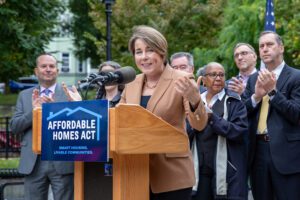Who is a member?
Our members are the local governments of Massachusetts and their elected and appointed leadership.

Gov. Maura Healey announces $4 billion housing bond bill at an event on Oct. 18 in Chelsea. (Photo courtesy Joshua Qualls/Governor’s Press Office)
The Healey-Driscoll administration today unveiled a $4.1 billion housing bond bill intended to jumpstart the production of homes and make housing more affordable across Massachusetts.
The Affordable Homes Act, a package of spending, policy and programmatic actions, represents the state’s largest-ever proposed investment in housing, while also addressing causes of housing unaffordability and making progress on climate goals.
In addition to $4.1 billion in capital spending authorizations, the bill includes 28 substantive policy changes or initiatives, three executive orders and two targeted tax credits, all directed at unlocking opportunities for production and preservation of housing. The majority of the spending will have benefits for moderate- and low-income households, according to the administration.
Gov. Maura Healey said an infusion of new homes is needed in Massachusetts to lower costs, accommodate population growth and achieve a healthy vacancy rate.
She said her plan would fund or enable the creation of more than 40,000 homes, including 22,000 new homes for low-income households and 12,000 new homes for middle-income households. In addition, the bill would preserve, rehabilitate or make resilience improvements to 12,000 homes for low-income households, support more than 11,000 moderate-income households, and fund accessibility improvements for 4,500 homes.
Healey added that the bill builds on housing development tax credits that were part of a tax relief package she signed on Oct. 4.
The administration said its bill would provide $1.6 billion for the repair, rehabilitation and modernization of the state’s more than 43,000 public housing units, including $150 million to begin “decarbonizing” public housing through the installation of heat pumps and electric appliances and another $15 million for accessibility upgrades.
Another $200 million would be authorized for the Housing Innovations Fund to support alternative forms of rental housing for people experiencing homelessness, housing for seniors and veterans, and transitional units for persons recovering from substance abuse.
In addition to helping to “green” Massachusetts’ public housing stock, the bill includes $115 million to ensure that new affordable housing developments meet increased standards while remaining economically viable. All the state’s housing investments would be required to prioritize and incorporate the state’s climate and decarbonization goals.
Policy initiatives include a local-option real estate transaction fee of 0.5% to 2% on the portion of a property sale over $1 million, or the county median home sale price. The administration said the fee would affect less than 14% of all residential sales, and would be paid by the seller of the property, with the money to be used to fund affordable housing developments within any community that adopts the provision.
The bill would add inclusionary zoning to the list of zoning changes that can pass by a simple majority, instead of the two-thirds supermajority, under the 2020 “Housing Choice” law.
The bill would allow accessory dwelling units of up to 900 square feet as of right throughout the state, with the ability for communities to set “some reasonable restrictions.” The MMA is opposed to this potential preemption of local zoning decision-making and will be raising these concerns as the bill makes its way through the legislative process.
Funding directed to housing production and preservation includes:
• $800 million for the Affordable Housing Trust Fund to provide resources to create or preserve affordable housing for households whose incomes are not more than 110% of area median income, and up to $50 million for MassDreams to create first-time homebuyer opportunities for households in Disproportionately Impacted Communities
• $425 million for the Housing Stabilization and Investment Fund to support preservation, new construction, and rehabilitation projects
• $175 million for the HousingWorks Infrastructure Program to fund municipal infrastructure projects to encourage denser housing development
• $100 million for CommonWealth Builder to spur construction of affordable homeownership opportunities
• $100 million for Mixed-Income Housing to support middle-income housing production
• $50 million for the Momentum Fund, a new initiative designed to leverage state resources to support large-scale, mixed-income multifamily development
The bill would also make the Community Investment Tax Credit Program permanent, and increase it from $12 million to $15 million per year, to support the work of Community Development Corporations. A new Homeownership Tax Credit would be created to spur production of homes affordable to first-time homebuyers earning not more than 120% of area median income.
Gov. Healey said she will also sign three executive orders creating a Housing Advisory Council to develop a statewide housing plan, creating an Unlocking Housing Production Commission to develop recommendations for streamlining housing production, and directing state agencies to develop an expanded inventory of state-owned land suitable for housing.
The administration has posted an Affordable Homes Act Fact Sheet as well as policy briefs.